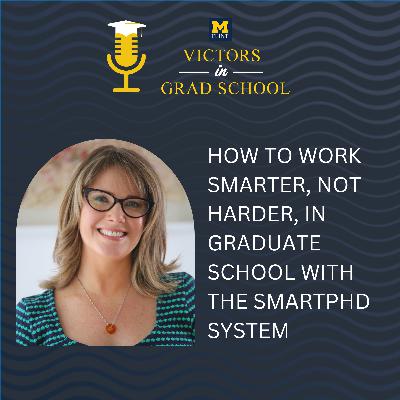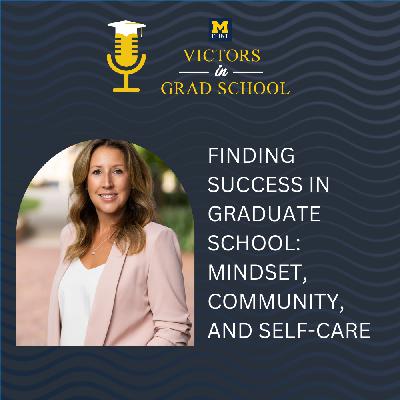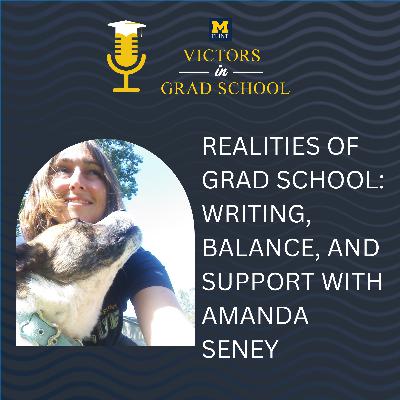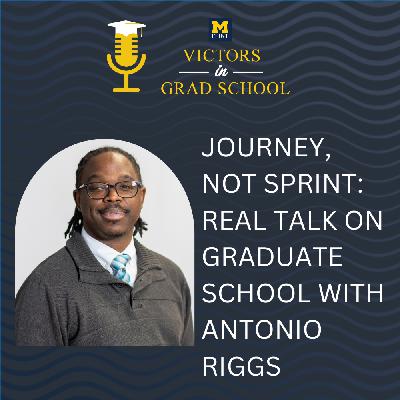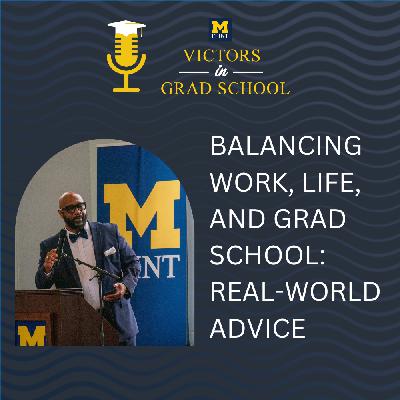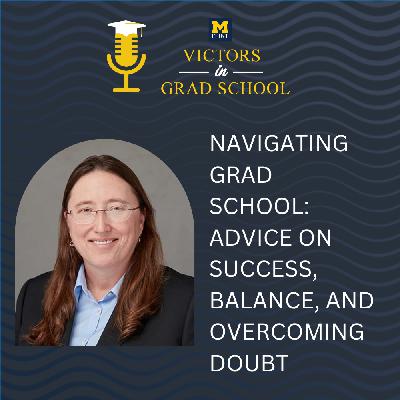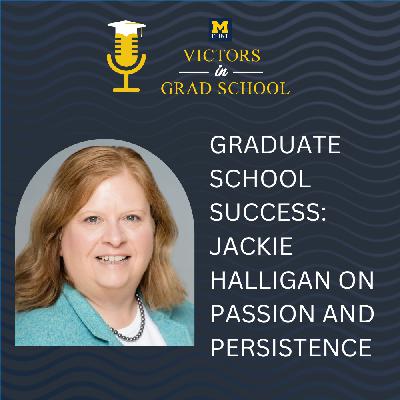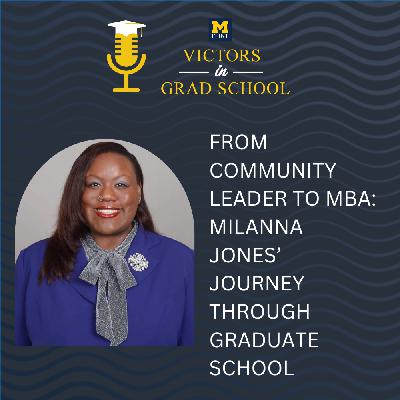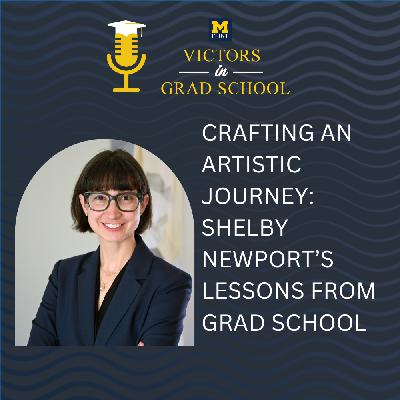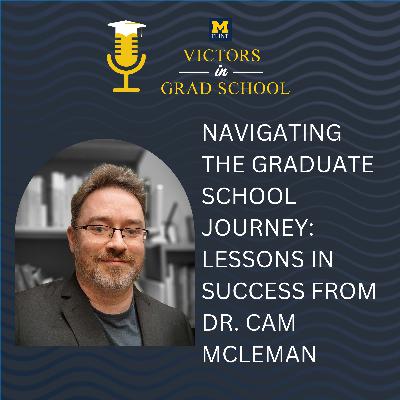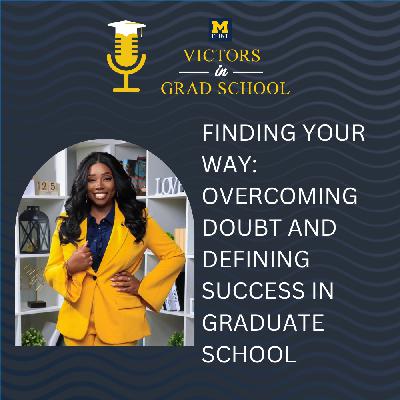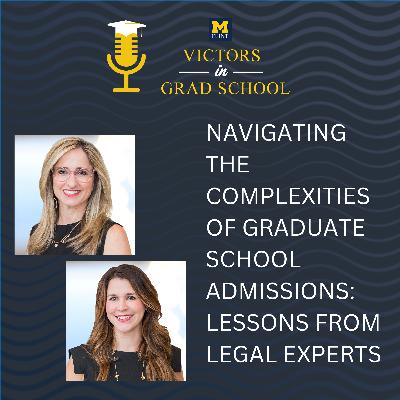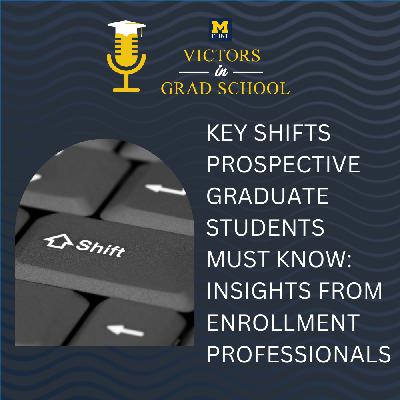Finding Success Amidst the Twists and Turns of Graduate School With Hilary Murmers
Description
The path to and through graduate school is rarely a straight line, and in a recent episode of the “Victors in Grad School” podcast, Hilary Murmers, LGBTQIA Coordinator at the University of Michigan, Flint, shares her remarkable journey—a testament to resilience, clarity of purpose, and the power of community.
Hosted by Dr. Christopher Lewis, the episode begins by exploring Hilary’s academic background. After graduating from the University of Rochester with a Bachelor of Arts in English and Women’s Studies, Hilary faced early rejection in her first attempt to enter PhD programs in gender studies. Instead of feeling defeated, she embraced diverse work experiences, which led her to a pivotal summer at Girls Leadership, a camp focused on the social-emotional development of girls and gender-diverse youth.
It was there, surrounded by important questions about identity and sexuality and feeling both unprepared and excited, that Hilary found her next calling: becoming a sex educator. “I started doing research in how does someone become a sex educator?... That led me to finding the graduate program I ended up in at Widener University.” Widener’s unique master’s program in human sexuality matched both her interests and her need for a queer-affirming, inclusive environment—a critical consideration she encourages other queer students to weigh when choosing programs.
Hilary’s graduate school experience included enormous challenges. Just as she was finding her stride, she was diagnosed with a rare cancer, forcing her to take medical leave and pause her studies. Even after recovery, she faced additional bumps: shifting program structures, a new student cohort, and the abrupt move to virtual instruction during the COVID-19 pandemic. “It felt uncomfortable, it felt bumpy... there were a lot of bumps and transitions that made it uncomfortable, and a lot of decision points of ‘do I keep going?’”
Through it all, Hilary credits her faculty advisor and perseverance for helping her navigate the many pivots. She also highlights the importance of clarity—knowing her “why” helped her persist: “As we face those bumps, we have to have some motivation to keep going... Graduate school can be fun, but it can also be really hard.”
This episode is a must-listen for anyone considering grad school, especially those facing uncertainty or adversity. Hilary’s story reminds us that while the journey may be unpredictable, support, adaptability, and a clear sense of purpose can see you through to your goals.
Tune in to the full episode to hear more about Hilary’s inspiring path—and let it fuel your own journey through graduate school!
TRANSCRIPT
Dr. Christopher Lewis [00:00:01 ]:
Welcome to Victors in Grad School, where we have conversations with students, alumni, and experts about what it takes to find.
Hilary Murmers [00:00:08 ]:
Success in graduate school.
Dr. Christopher Lewis [00:00:11 ]:
Welcome back to Victors in Grad School. I'm your host, Dr. Christopher Lewis, Director of Graduate programs at the University of Michigan, Flint. Really excited to have you back again this week, as we always are, talking about your journey, your journey toward graduate school, through graduate school, beyond graduate school. Because it is so important to be able to look at all aspects of ways in which you can be successful. And that's what this show is all about. This show is all about helping you to identify ways in which you can find success sooner. That's why every week, I love being able to bring you different people with different experiences that can help you to understand the journey that they went on, to help you better have some tools for your toolbox to understand what they went through, because what they went through might provide you with some understanding of things that you could go through, but also some things that you can prepare for as you're thinking about the future.
Dr. Christopher Lewis [00:01:12 ]:
So I'm really excited to be able to have our guest today. Hilary Murmurs is with us today, and Hilary is the LGBTQIA coordinator at the University of Michigan, Flint. And she has her own journey, and she's had her own journey, and I'm really excited to be able to talk with her about her journey, to have her share that with you. Hillary, thanks so much for being here today.
Hilary Murmers [00:01:35 ]:
Yeah, thanks for having me, Chris. I'm happy to be here.
Dr. Christopher Lewis [00:01:37 ]:
Now, I know that you did your undergraduate work at the University of Rochester, where you were working on that Bachelor of Arts in English and Women's Studies, and then you went off, you went off, you had got some experiences, and at some point you decided to continue on, continue on to get that master's degree. Can you take me back in time to that point in your life and what was going through your head as you made that choice that you were going to go to graduate school, and why was it the right time?
Hilary Murmers [00:02:06 ]:
Yeah, that's a great question. I tried to go to graduate school before. I ultimately did when I was graduating with my bachelor's in English and Gender Studies. I had applied to some PhD programs in gender studies and didn't get into a single one, which is interesting now. Like, I do the work I'm doing in higher ed, but it was kind of failed first attempt. And so I took a few years and worked and had a lot of different experiences. And then I had one summer where I worked at a summer camp called Girls Leadership. That's all about social emotional development and girls and gender diverse young people and being openly queer.
Hilary Murmers [00:02:47 ]:
In that space, I was receiving a lot of questions about identities and sexuality, safer sex that I frankly felt totally unprepared to answer. But I was really excited by. I was really like, this is cool and interesting to me. And so I started doing research in how does someone become a sex educator? And what do careers in sex and sexuality education look like? And that led me to finding the graduate program I ended up in at Widener University. It's a really unique master's degree in human sexuality. It's one of the only, like, specifically human sexuality degrees in the country. And at the time, I also had a full time job that had some tuition benefits that I could take to another institution. I was working at my alma mater at University of Rochester.
Hilary Murmers [00:03:40 ]:
And so I was like, let's go. I'm going to apply to graduate school and become a sex educator. So, yeah, I applied in spring of 2016 and started in fall of 2016. So three years after I graduated with my bachelor's.
Dr. Christopher Lewis [00:03:54 ]:
Talk to me a little bit about what you were just talking about, because you were talking about that there definitely were some things that you had to consider being queer and thinking about graduate school where you fit and what was the right fit in that regard. I know you ended up at Widener, but talk to me about as someone entering into a graduate space like that and being queer, as you mentioned, what were some of the things that you had to truly consider for yourself in regards to safety, in regards to other aspects that you were looking for in a graduate program that might help others that might be queer as well, that they might need to think about in their own journey.
Hilary Murmers [00:04:33 ]:
I think there's ways in which the institution that I went to was not the biggest question for me. Widener itself, like, is not an institution that I have a lot of attachment to, but for me, it was really dialing down into finding the program that felt like I would be getting the education that I needed and that it was a space where there were lots of queer and trans people, where there were conversations about queer and trans identities, like, baked into the program. It was a place where, like, when I looked at the materials online, frankly, I saw people who looked like me and I felt like it was a place where I could fit in. Part of my application experience was also doing a interview. So I got to go to campus and meet some current students and meet faculty members and just felt a really strong connection of this. Feels Like a place where I can be safe. I think it's also really important to name that I am white, I am cisgender. I have these other privileged identities that make safety less of an issue for me than for others in the queer community.
Hilary Murmers [00:05:47 ]:
But yeah, for me it was really about dialing into like this is exactly the thing I want to study and these are the people I want to study it with.
Dr. Christopher Lewis [00:05:56 ]:
You know, every student as they go into graduate school, go through some transitions, academic transitions, psychological transitions, social transitions. And as you transition in, you go through some transitions. But then as you're going through those transitions as well as you learn more and as you connect or disconnect, talk to me about those transitions for you. And what did you have to do as you transitioned into graduate school and also what did you have to do as you went through graduate school to set yourself up for success and maintain that success throughout the graduate school program?
Hilary Murmers [00:06:32 ]:
Yeah, so I had a bumpy ride through graduate school due to life circumstances. So when I started my program in fall of 2016, I had a fu


